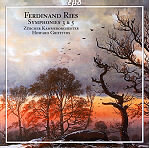Ferdinand Ries (1784-1838) enjoyed a long and productive life, but is best known historically as a friend of Beethoven. The two symphonies on display here certainly reveal a measure of Beethoven’s influence, though this is to some extent a function of an ex post facto phenomenon. Simply put, Beethoven’s symphonies so dominate our perception of the period 1800-1825 that no other composer’s contemporaneous works are ever performed. This makes it all but impossible to say for certain what elements of Beethoven’s mature style might have been drawn from the musical “common currency” of the day. Discs like this go a long way toward answering this intriguing question. Ries’ Fifth Symphony, for example, which was premiered in 1921, uses the three trombones of Beethoven’s Fifth, but no clarinets. The Third, dating from 1815, has clarinets instead of oboes, and a single bass trombone in addition to the usual pairs of horns and trumpets. The Fifth also shows its composer making an effort at cyclical construction, deriving his thematic material in the finale from the first movement. These are, in short, fascinating works, well worth listening to both for their individual merits and for the light they cast on a period about which, Beethoven aside, we know virtually nothing symphonically speaking. Performances and sound make a very good case for the music.
































